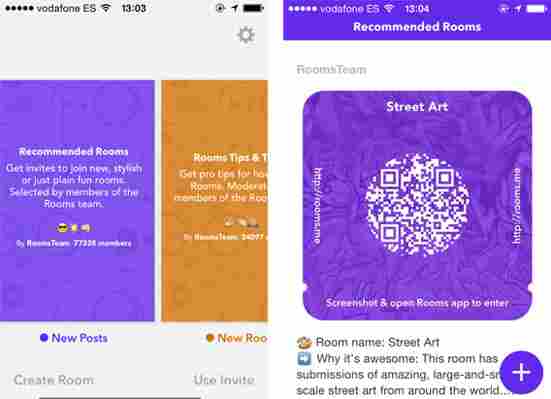I’m not a fan of Rooms . The new app from Facebook is bringing back late 90s chat rooms in a 2010 way, adding image and video streams to the mix and letting people comment in private rooms that are only accessible through QR code invites . Reaction so far has been fairly positive, but I’m less than impressed with this largely touted ‘anonymous chat’ app from Facebook.
Back to the early days of the web
In an interview with TechCrunch , Creator Josh Miller claims that the app isn’t as much about anonymity as it is about identity, citing its ability to let you “make the social network that’s perfect for you”. Rooms lets users create their own platform, like in the early days of the web. Users can have dialogue around basically anything they want, without having to associate their real identities to the discussion. Rooms achieves this anonymous identity without the need for registering (although you can associate your ID with an email if you want), along with the ability to pick a different nickname for each room you want to contribute to. According to Miller, the hope is to build active communities that people will keep coming back to.
Once you scan a QR code, the room will be added to your list

My problem with Rooms isn’t necessarily it’s concept, but its delivery and subsequently cited use case. For starters, the idea of creating a conversation, basically a forum, doesn’t seem conducive to the way the app’s designed. The focus of Rooms is around image streams, similar to Instagram, and from what I’ve seen so far, commentary and discussion around those images is limited. This makes me dubious about the ‘chat’ references being thrown around about the app, as well as the potential for a real forum for discussion.
As an example, Miller cited two rooms which he was particularly proud of: one for backpackers or travelers looking for hidden travel gems off the beaten path, and another for individuals in the transgender community looking for an anonymous forum for discussion.
For me, one seems much more logical than the other. It makes sense to want to discuss sensitive or serious topics– like those in the transgender community– anonymously, but things like travel advice seem much less useful, especially when you consider the design of the app. If you’re looking for real travel advice, you’re not going to scroll through a stream of images in the hopes that you’ll come across a locale in your vicinity that you’d like to go to. With no hashtags or search function , finding any useful travel information seems unlikely, and even if you’re not looking for actual tips but purely out of interest, it’d be just as easy to look for hashtags or geo-located tags in Instagram.
Instagram’s geo-tags seems a lot more useful than Rooms’ descriptions, and with no comments, the community doesn’t seem active.

Back to building a community
In terms of practicality, Rooms is based on hunting for rooms or creating them based on specific topics. But because it’s not based on trends or popularity, and because there’s no search within the app, relevant rooms can actually be tough to find, especially if you don’t know where to look. Even if you want to find a room about a certain topic, you’ll have to look to see if there’s a QR code (another outdated tool) available for it on another social network. It’s kind of like a crap shoot; ask around or scour the web to see if there’s a room for what you’re looking for. So far, Instagram and Twitter seem to be the only places to find QR codes in bulk. In terms of being practical… it’s just not.
You can find QR codes by searching #Rooms, but even then it’s hit and miss.
On top of that, like with any new social network, building a community from scratch, especially a robust one with a multitude of active rooms, is no easy task . There are already plenty of well-established forums out there, accessible and manageable through apps like Tapatalk or Reddit’s Alien Blue , which actually have the potential for more robust discussions.
To me, it seems as if Facebook is once again trying to attach its name to a trend that’s already saturated the market (see Slingshot and Paper ). There’s certainly a desire for the ability to anonymously express one’s self online, but as far as apps go, Whisper and Secret already contribute to the ability to “ anonymously ” post things. A service like Reddit takes care of trending conversation threads with semi-anonymous identities.
Back to the drawing board
Miller claims that he’s bringing back the excitement of the early web and the ability to freely move around online with an identity that doesn’t reveal definitively who you are. The question is whether or not people want to go back to that pseudo-identity of online days past. I for one, don’t see the value.
Having said that, if there is a big market out there for this kind of identity-free forum hub, the app could be useful. Unfortunately, I don’t think that the way Rooms is designed is conducive to achieving the type of open discussion it’s hoping to.
If Rooms really wants to create something useful, Miller and Co. will have to look beyond QR code gimmicks and closed, invite-only networks to create a space that’s open and invites useful discussion, not simply based on liking or commenting on images in Instagram-like feeds.
If you wanna check it out for yourself, download Rooms for iOS.
Related articles:
Anonymous social networks and chat apps: why are they suddenly so cool?
Secret and Whisper know your location, even if your friends don’t
‘Anonymous’ social networks like Secret fail to provide anonymity
Follow me on Twitter: @suzieblaszQwicz
